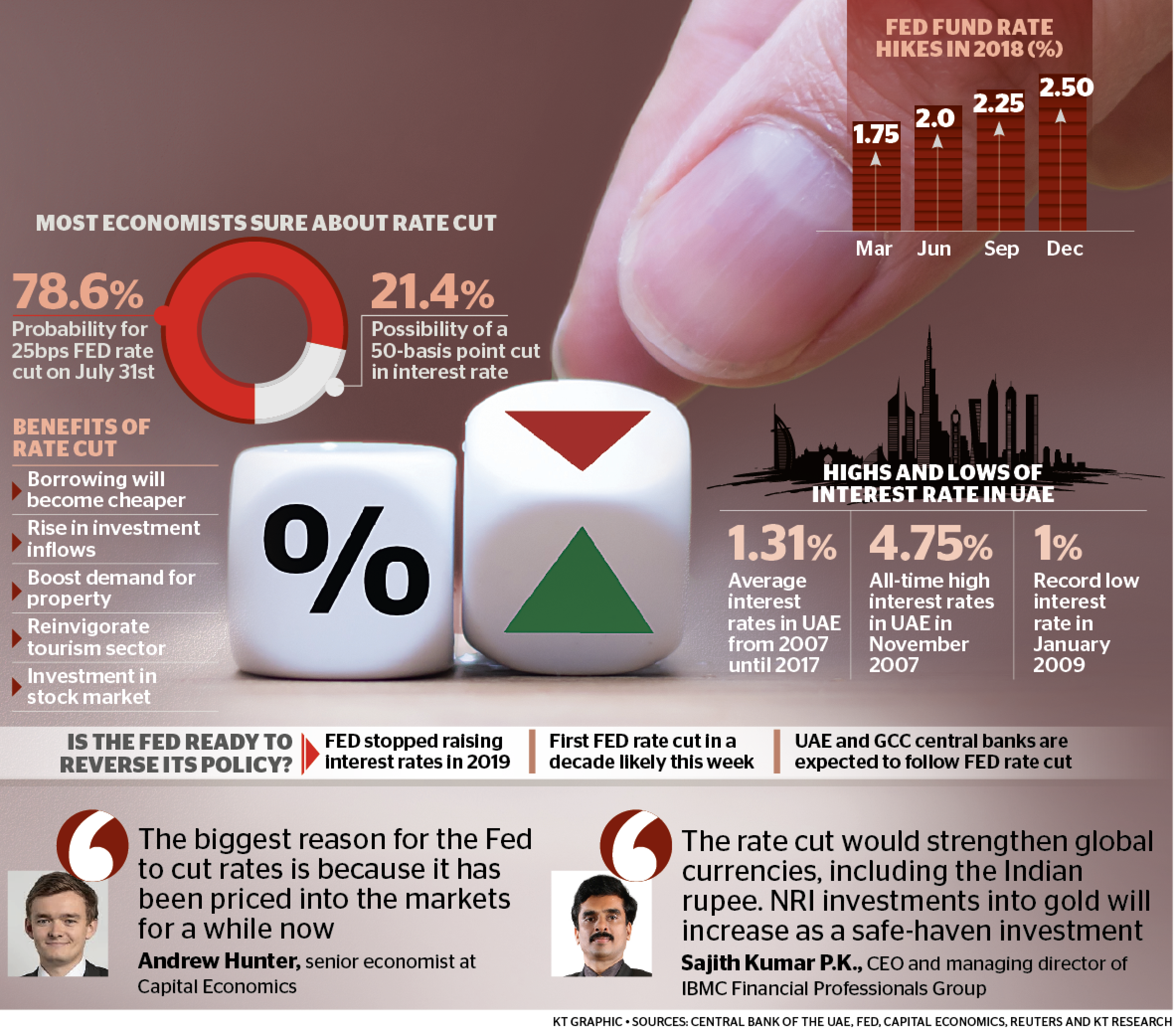The widely-anticipated interest rate cut by the GCC central banks this week, in line with the US Federal Reserve's monetary loosening, may impact positively on the region's economies.
{"preview_thumbnail":"https://cdn.flowplayer.com/6684a05f-6468-4ecd-87d5-a748773282a3/i/v-i-a…","video_id":"ac42da46-10ce-476d-b0d6-9c52511705e0","player_id":"8ca46225-42a2-4245-9c20-7850ae937431","provider":"flowplayer","video":"Top 10 Safest Countries in 2019"}
Monetary experts believe the impending rate cut would make borrowing cheaper for investors in the UAE and other GCC economies, while triggering investment inflow from overseas in the run-up to Expo 2020. It will also give a fillip to the property market and reinvigorate the tourism with attractive exchange rates.
However, analysts at Capital Economics have a different view. According to them, past experience suggests that this week's Fed cut is unlikely to provide a significant boost to the economy.

"The Gulf's dollar pegs and open capital accounts mean that central banks are forced to adopt US monetary policy. Accordingly, once the Fed cuts rates, policymakers in the Gulf will quickly follow suit. In theory, looser monetary conditions should boost credit growth in the Gulf," analysts at Capital Economics said.
"For expatriates sending money to home countries, the rate cut and subsequent weakening of the local currency will not be an attractive opportunity as it will make their home currencies strengthen," said a money exchange dealer.
Sajith Kumar P.K., CEO and managing director of IBMC Financial Professionals Group, said the rate cut would strengthen global currencies including the Indian rupee. "NRI investments into gold will increase as a safe-haven investment. Gold will take the lead as a shining investment tool into 2020."
"Lower interest rates will encourage borrowing and stimulate economic growth in the UAE. It will also have a positive impact on the real estate sector with lower mortgage interest rates, making it more attractive for potential homebuyers while easing the burden on existing borrowers," said M.A.K. Harid, managing director of Paradigm Investment Services.
Like elsewhere, monetary loosening through interest rate cut will boost stock and property markets, while hitting returns on cash and driving down the value of the dollar and consequently, all Gulf currencies pegged to the dollar, he said.
"Lower interest rate may not be good news for savers in the UAE or other Gulf countries, but it certainly offers an advantage to residents who are planning to borrow money to buy a property as they may be able to secure cheaper financing," said Harid.
"The outflow of funds from the US will boost inflow into emerging markets, especially India. Weakness of the greenback and interest rate cut will boost gold price. Systematic investment in gold will support investors and strengthen their investment portfolio," said Kumar.
Interest rate traders are betting that a rate cut of at least 25 basis points is a certainty, according to CME Group's Fedwatch. They have priced in a 19.4 per cent probability of a 50-basis point cut, which would drop the Fed's target rate range to 1.75 per cent to 2 per cent.
However, over 95 per cent of 111 economists polled by a news agency predict a 25-basis point cut at Fed's July 30-31 meeting. Only two economists polled expected a 50-basis point reduction and a further two said the Fed would hold steady.
Rates are being cut because the global economy is slowing down amid the escalation of geopolitical risks.
"The biggest reason for the Fed to cut rates is because it has been priced into the markets for a while now. If they didn't follow through and cut, it would cause a bit of a shock," said Andrew Hunter, senior economist at Capital Economics.
At a time when the US, Europe and China are all slowing, the rate cut and easy credit will be welcome news for the region's economy and businesses, according to analysts.
Fed chair Jerome Powell has all but confirmed that US interest rates will be cut at the FOMC meeting, which concludes on Wednesday, July 31.
"The consensus and our own forecast is for a 25-basis point cut. Further ahead, we expect the Fed to lower interest rates two more times by March next year," said analysts at Capital Economics.
Once the Fed cuts rates, policymakers in the Gulf will quickly follow suit. "In theory, looser monetary conditions should boost credit growth in the Gulf. However, past experience shows that it is not that simple in practice," analysts said.
While credit growth started to slow when the Fed's recent tightening cycle began in late-2015, it recovered from mid-2017 even as the Fed continued to raise interest rates.








